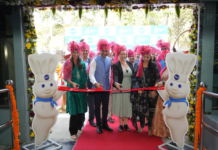
The Indian Council of Agricultural Research (ICAR), the apex body for coordinating, guiding, and managing research and education in agriculture, and the World Bank have come together to announce the first international conference on ‘Blended Learning Ecosystem for Higher Education in Agriculture’ in India under the National Agricultural Higher Education Project (NAHEP).
The three-day event to be held from March 21-23 in New Delhi will be hosted by ICAR – IASRI (Indian Agricultural Statistics Research Institute), which is a multi-partner global forum to support collaboration for the development of a state-of-the-art blended education system for higher agricultural education.
The aim of the conference is to facilitate the development of a global ecosystem of partners from academia, industry, government, and multilateral and bilateral organizations that would provide critical insights toward the design and full-scale implementation of all aspects of the Resilient Agricultural Education System (RAES) under National Agricultural Higher Education Project (NAHEP), that is, learning management system, content repository, and system-wide capacity building. Apart from the engaging discussions the three-day event will also showcase an exhibition on the diverse range of services and offerings in the field of agriculture and blended learning.
The conference and exhibition will be inaugurated by Narendra Singh Tomar, Minister of Agriculture and Farmers Welfare. Various other ministries will participate along with other global leading institutions such as AICTE, IIT, and IRRI among others. Eminent speakers include Himanshu Pathak, secretary, the Department of Agriculture Research and Education (DARE) and director general (DG), ICAR, Union Ministry of Agriculture and Farmers Welfare, R C Agrawal, Deputy director general (agricultural education), ICAR, Ministry of Agriculture and Farmers Welfare and Dr. Auguste Tano Kouame, Country director, The World Bank among others.
Himanshu Pathak said, “According to the International Monetary Fund (IMF), the agriculture sector in India contributes 17-18% of the gross value added (GVA) of the economy and employs more than 40% of the workforce. Farmers are adopting new technologies to improve and monitor crop health and production. The true adoption of blended learning has immense potential and can unlock the agriculture economy to new heights.’’
RC Agrawal said the focus of the conference is to strengthen the collaboration among multiple implementing agencies working in the domains of remote learning, digital education, and blended education systems. “It will also help in establishing synergies with flagship programs such as Digital India and Skill India to accelerate the deployment of the Resilient Agricultural Education System under NAHEP.”
The conference is organized around the thematic areas including strategies for blended teaching-learning, technologies for blended learning, sustainability in the blended learning ecosystem, building stakeholder capacities to navigate in a blended teaching-learning ecosystem, and contemporary curriculum for agricultural education.
NAHEP, which was proposed on a 50:50 cost-sharing basis between the World Bank and the Government, was formulated by ICAR with a total cost of US$ 165 million for five years in the financial year 2017-18. It was undertaken to strengthen India’s National Agricultural Education System.
IndiFoodBev — authentic, impactful and influential
An English-language food and beverage processing and packaging industry B2B platform in print and web, IndiFoodBev is in its third year of publication. It is said that the Indian food and beverage industries represent approximately US$ 900 billion in revenues which implies more than 20% of the country’s GDP. Eliminating the wastage on the farmside can help to deliver more protein to a higher number of the population apart from generating sizable exports. The savings in soil, seeds, water, fertilizer, energy and ultimately food and nutrition could be the most immense contribution that country is poised to make to the moderation of climate change.
To improve your marketing and grow sales to the food and beverage processing and packaging industry, talk to us. Our research and consulting company IppStar [www.ippstar.org] can assess your potential and addressable markets in light of the competition. We can discuss marketing, communication, and sales strategies for market entry and growth.
Suppliers and service providers with a strategy and budget for targeted marketing can discuss using our hybrid print, web, video, and social media channels to create brand recognition linked to market relevance. Our technical writers are ready to meet you and your customers for content.
The second largest producer of fruit and vegetables in the world is continuously expanding processing capacities and delivery systems with appropriate innovative technologies. We cover product and consumer trends, nutrition, processing, research, equipment and packaging from farm to thali. Get our 2025 media kit and recalibrate your role in this dynamic market. Enhance your visibility and relevance to existing markets and turn potential customers into conversations. Ask for a sample copy of our bi-monthly in print or our weekly IndiFoodBev eZine each Wednesday.
For editorial info@ippgroup.in — for advertisement ads1@ippgroup.in and for subscriptions subscription@ippgroup.in
Naresh Khanna – 10 February 2025
Subscribe Now










